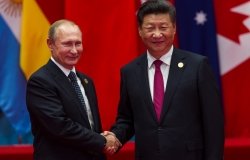Book Launch---Senator Mansfield: The Extraordinary Life of a Great Statesman and Diplomat
Don Oberdorfer, former diplomatic correspondent, Washington Post; Lee H. Hamilton, president and director, Woodrow Wilson Center.
Overview
Mike Mansfield, whose birthday centenary we celebrate this year, was an American original: a child of Irish immigrants . . . eighth grade dropout . . . veteran of the army, the navy, and the Marine Corps before his 20th birthday . . . copper miner . . . twenty-eight-year-old college freshman . . . professor of Far East history . . . US congressman and senator from Montana . . . Senate majority leader for a record 16 years . . . Vietnam dove . . . US ambassador to Japan under Presidents Carter and Reagan for nearly 12 years, another record for longevity . . . exemplar of bipartisanship . . . adviser to presidents . . . and lifelong student of Asia.
On October 28 the Asia Program and the Cold War International History Project hosted a book launch for Don Oberdorfer’s new biography of Mansfield, Senator Mansfield: The Extraordinary Life of a Great Statesman and Diplomat. Oberdorfer, formerly the chief diplomatic correspondent for the Washington Post and currently Distinguished Journalist in Residence at Johns Hopkins’ School of Advanced International Studies, was joined on the stage by Lee H. Hamilton, Wilson Center president and frequent collaborator with Mansfield during their time together in the US Congress.
Hamilton shared some of his personal memories of Mansfield, whom he called “among the finest public servants America has produced.” Among the qualities Hamilton ascribed to Mansfield were a lack of pretense, a genuine interest in others, a common touch, an unusual (for a politician) bluntness, and a willingness to give credit to others. Mansfield, Hamilton observed, was a strong partisan who went out of his way to avoid antagonizing those with whom he disagreed. Respect and indeed affection for Mansfield cut across party lines, he added, in a way that one rarely sees in the more partisan and polarized political climate of today.
Mike Mansfield, Oberdorfer insisted, although no longer alive, has much to teach us today. Chief among the Montanan’s beliefs was the conviction that force is unlikely to solve political problems. This opinion evolved over time as the United States found itself, in the late 1950s and 1960s, drawn ever deeper into Vietnam. It ultimately shaped his opposition to the US war in Indochina, a dissent he offered, usually in private, to three successive presidents, beginning with Kennedy. “It’s not easy to look into the eyes of a president, especially one like Lyndon Johnson, and while everyone else is saying ‘yes,’ to say ‘no,’” Oberdorfer remarked. Mansfield would later lament that his inability to keep the United States from becoming entangled in Vietnam was the great failure of his public career.
He was far more successful in working with Richard Nixon to open US diplomatic ties with China in the early 1970s. His long tenure as ambassador in Tokyo helped solidify what Mansfield always insisted was America’s “most important bilateral relationship, bar none.” And yet, Oberdorfer concluded, Mansfield himself, despite a career of public accolades, always claimed that his greatest satisfaction during his 34 years in Congress was “saving Flathead Lake,” a freshwater lake in Montana which the US Army Corps of Engineers in the 1940s sought to expand in order to produce energy for West Coast consumers, an undertaking that would have flooded Montanan towns and rich farmland. Mansfield never forgot his Montana roots, which perhaps is why he went so far in a distinguished career.
Drafted by Robert M. Hathaway
Asia Program, 691-4020
Hosted By

Indo-Pacific Program
The Indo-Pacific Program promotes policy debate and intellectual discussions on US interests in the Asia-Pacific as well as political, economic, security, and social issues relating to the world’s most populous and economically dynamic region. Read more

Cold War International History Project
The Cold War International History Project supports the full and prompt release of historical materials by governments on all sides of the Cold War. Through an award winning Digital Archive, the Project allows scholars, journalists, students, and the interested public to reassess the Cold War and its many contemporary legacies. It is part of the Wilson Center's History and Public Policy Program. Read more
Thank you for your interest in this event. Please send any feedback or questions to our Events staff.










